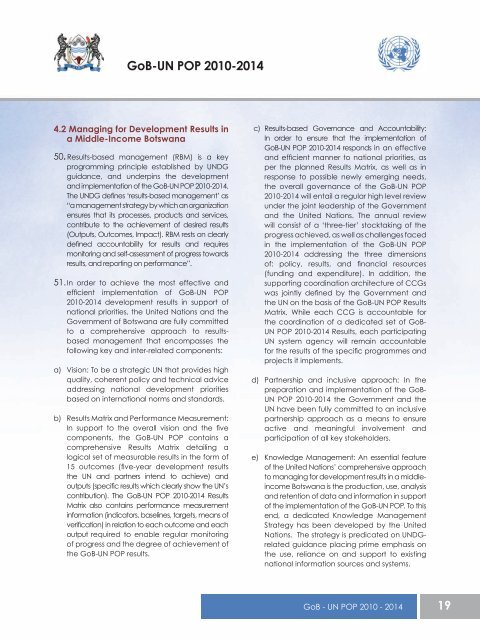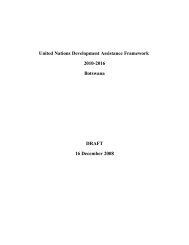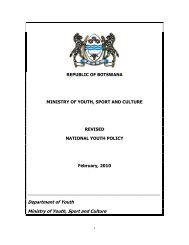GoB-UN POP 2010-2014 - UNFPA Botswana
GoB-UN POP 2010-2014 - UNFPA Botswana
GoB-UN POP 2010-2014 - UNFPA Botswana
- No tags were found...
You also want an ePaper? Increase the reach of your titles
YUMPU automatically turns print PDFs into web optimized ePapers that Google loves.
<strong>GoB</strong>-<strong>UN</strong> <strong>POP</strong> <strong>2010</strong>-<strong>2014</strong>4.2 Managing for Development Results ina Middle-Income <strong>Botswana</strong>50. Results-based management (RBM) is a keyprogramming principle established by <strong>UN</strong>DGguidance, and underpins the developmentand implementation of the <strong>GoB</strong>-<strong>UN</strong> <strong>POP</strong> <strong>2010</strong>-<strong>2014</strong>.The <strong>UN</strong>DG defines ‘results-based management’ as“a management strategy by which an organizationensures that its processes, products and services,contribute to the achievement of desired results(Outputs, Outcomes, Impact). RBM rests on clearlydefined accountability for results and requiresmonitoring and self-assessment of progress towardsresults, and reporting on performance”.51. In order to achieve the most effective andefficient implementation of <strong>GoB</strong>-<strong>UN</strong> <strong>POP</strong><strong>2010</strong>-<strong>2014</strong> development results in support ofnational priorities, the United Nations and theGovernment of <strong>Botswana</strong> are fully committedto a comprehensive approach to resultsbasedmanagement that encompasses thefollowing key and inter-related components:a) Vision: To be a strategic <strong>UN</strong> that provides highquality, coherent policy and technical adviceaddressing national development prioritiesbased on international norms and standards.b) Results Matrix and Performance Measurement:In support to the overall vision and the fivecomponents, the <strong>GoB</strong>-<strong>UN</strong> <strong>POP</strong> contains acomprehensive Results Matrix detailing alogical set of measurable results in the form of15 outcomes (five-year development resultsthe <strong>UN</strong> and partners intend to achieve) andoutputs (specific results which clearly show the <strong>UN</strong>’scontribution). The <strong>GoB</strong>-<strong>UN</strong> <strong>POP</strong> <strong>2010</strong>-<strong>2014</strong> ResultsMatrix also contains performance measurementinformation (indicators, baselines, targets, means ofverification) in relation to each outcome and eachoutput required to enable regular monitoringof progress and the degree of achievement ofthe <strong>GoB</strong>-<strong>UN</strong> <strong>POP</strong> results.c) Results-based Governance and Accountability:In order to ensure that the implementation of<strong>GoB</strong>-<strong>UN</strong> <strong>POP</strong> <strong>2010</strong>-<strong>2014</strong> responds in an effectiveand efficient manner to national priorities, asper the planned Results Matrix, as well as inresponse to possible newly emerging needs,the overall governance of the <strong>GoB</strong>-<strong>UN</strong> <strong>POP</strong><strong>2010</strong>-<strong>2014</strong> will entail a regular high level reviewunder the joint leadership of the Governmentand the United Nations. The annual reviewwill consist of a ‘three-tier’ stocktaking of theprogress achieved, as well as challenges facedin the implementation of the <strong>GoB</strong>-<strong>UN</strong> <strong>POP</strong><strong>2010</strong>-<strong>2014</strong> addressing the three dimensionsof: policy, results, and financial resources(funding and expenditure). In addition, thesupporting coordination architecture of CCGswas jointly defined by the Government andthe <strong>UN</strong> on the basis of the <strong>GoB</strong>-<strong>UN</strong> <strong>POP</strong> ResultsMatrix. While each CCG is accountable forthe coordination of a dedicated set of <strong>GoB</strong>-<strong>UN</strong> <strong>POP</strong> <strong>2010</strong>-<strong>2014</strong> Results, each participating<strong>UN</strong> system agency will remain accountablefor the results of the specific programmes andprojects it implements.d) Partnership and inclusive approach: In thepreparation and implementation of the <strong>GoB</strong>-<strong>UN</strong> <strong>POP</strong> <strong>2010</strong>-<strong>2014</strong> the Government and the<strong>UN</strong> have been fully committed to an inclusivepartnership approach as a means to ensureactive and meaningful involvement andparticipation of all key stakeholders.e) Knowledge Management: An essential featureof the United Nations’ comprehensive approachto managing for development results in a middleincome<strong>Botswana</strong> is the production, use, analysisand retention of data and information in supportof the implementation of the <strong>GoB</strong>-<strong>UN</strong> <strong>POP</strong>. To thisend, a dedicated Knowledge ManagementStrategy has been developed by the UnitedNations. The strategy is predicated on <strong>UN</strong>DGrelatedguidance placing prime emphasis onthe use, reliance on and support to existingnational information sources and systems.<strong>GoB</strong> - <strong>UN</strong> <strong>POP</strong> <strong>2010</strong> - <strong>2014</strong> 19







